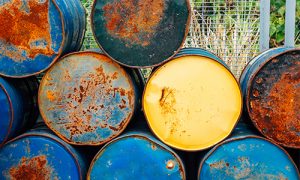 A recent study warns that U.S. nuclear waste storage containers could corrode, according to Ohio State News.
A recent study warns that U.S. nuclear waste storage containers could corrode, according to Ohio State News.
On January 27, in the paper, “Self-accelerated corrosion of nuclear waste forms at material interfaces,” researchers reported that the “corrosion of nuclear waste storage materials accelerates because of changes in the chemistry of the nuclear waste solution, and because of the way the materials interact with one another,” risking harm to people and the surrounding environment.
The U.S. Government Accountability Office says most of the waste is stored where it is generated, that is over 90,000 metric tons of nuclear waste in 80 different sites across the United States.
One of the paper’s researchers—and Journal of The Electrochemical Society technical editor—Gerald Frankel, states:
The U.S. plan for high-level nuclear waste includes the immobilization of long-lived radionuclides in glass or ceramic waste forms in stainless-steel canisters for disposal in deep geological repositories. Under simulated repository conditions, corrosion could be significantly accelerated at the interfaces of different barrier materials, which has not been considered in the current safety and performance assessment models. Severe localized corrosion was found at the interfaces between stainless steel and a model nuclear waste glass and between stainless steel and a ceramic waste form. The accelerated corrosion can be attributed to changes of solution chemistry and local acidity/alkalinity within a confined space, which significantly alter the corrosion of both the waste-form materials and the metallic canisters. The corrosion that is accelerated by the interface interaction between dissimilar materials could profoundly impact the service life of the nuclear waste packages, which, therefore, should be carefully considered when evaluating the performance of waste forms and their packages. Moreover, compatible barriers should be selected to further optimize the performance of the geological repository system.
The government is now looking into more permanent sites for its nuclear waste and is considering constructing a nuclear waste dump beneath Yucca Mountain in Nevada.
Read the full article here. Learn more about Frankel and his work here.
Attending the 237th ECS Meeting with the 18th International Meeting on Chemical Sensors (IMCS 2020)? Check out our technical sessions on corrosion, among other topics as well!


